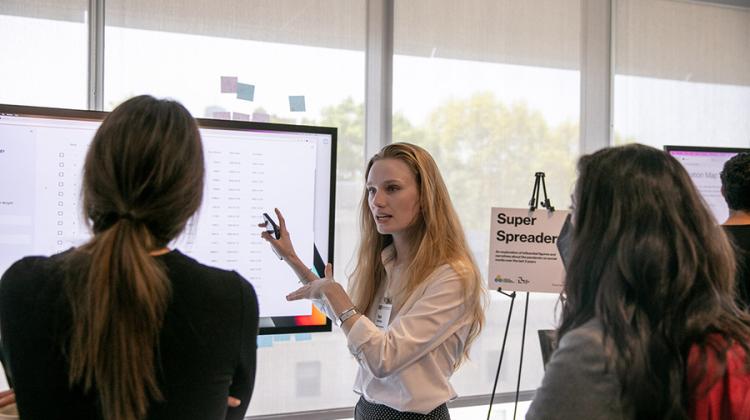MIT’s Center for Constructive Communication takes aim at the destructive nature of social media

PhD candidate Hope Schroeder demonstrates work conducted with fellow graduate student Shayne Longpre on understanding the spread of Covid-19 information on Twitter. Image: Artemisia Luk
Ellen Hoffman | Media Lab
The MIT Center for Constructive Communication (CCC) and the closely affiliated nonprofit Cortico today announced the launch of a broad-based effort that draws on expertise in face-to-face human dialogue, digital networks, and machine learning to develop safe and trusted spaces for meaningful, nonpolarizing human connection and civic impact. This effort has attracted commitments of $21 million from philanthropic individuals and organizations, including a foundational gift from the international nonprofit Project Liberty. Of the total commitments, $8.5 million is directed to research conducted by CCC in collaboration with MIT’s Sociotechnical Systems Research Center, and the remainder to Cortico.
The goal is to develop and deploy technologies and methods to accelerate more trusted and meaningful communications within and across communities. Initial projects will research and experiment with new forms of social networks grounded in small group dialogue and decentralized social network designs, including the open-source Decentralized Social Networking Protocol (DSNP) that was released by Project Liberty in 2021. Other planned projects include the development of AI-powered sensemaking tools for community listening, as well as hardware to integrate real-life conversations with digital networks. These combined efforts focus on providing healthier alternatives to the current social media platforms controlled by dominant tech companies.
“With growing evidence that social media is weakening our social fabric and threatening our democracy, it’s critical that we find new ways forward,” says CCC Director Deb Roy, MIT professor of media arts and sciences and co-founder and CEO of Cortico. “While we acknowledge that whatever new platform we develop won’t be able to compete with social media platforms for entertainment value, they can provide alternative, scalable spaces for trusted and civil public discourse that is so critical for rebuilding a healthy democracy.”
The work enabled by this gift will advance CCC’s research in sensemaking, machine learning, and digital design through a close collaboration with Cortico, which will work with CCC to develop prototypes that can then be translated into scalable solutions. These efforts involve launching pilot programs with a wide network of community organizations to evaluate which tools offer the greatest potential to create more trusted, less divisive communication. Research is based at the Media Lab with growing collaborations with the Sociotechnical Systems Research Center and the Institute for Data, Systems, and Society.
“This effort will draw on MIT’s strong cross-disciplinary research tradition to address the increasingly divisive nature of today’s social media culture. I look forward to seeing how this collaboration’s in-depth research in AI, sensemaking, machine learning, and digital design will come together to help create more trusted social networks that will foster more meaningful and constructive dialogues,” says Maria T. Zuber, the E.A. Griswold Professor of Geophysics and vice president for research at MIT.
The effort will leverage a longstanding cooperative agreement between researchers at MIT and Cortico that enables collaboration on intellectual property, prototyping, and field pilots. In addition to Project Liberty, the effort is supported by Reid Hoffman, the Quadrivium Foundation, Yat Siu, the Knight Foundation, and Ray Chambers/MCJ Amelior Foundation.
Frank McCourt, founder and executive chairman of Project Liberty, sees support for this new effort as “a critical investment to strengthen democracy” that will highlight the importance of comprehensive, collaborative action. “If we do this right,” says McCourt, “the dominance of a few Goliathan social media platforms will give way to a thousand Davids that support healthier digital communities and serve society at large.”
"We at Project Liberty are committed to developing and delivering cutting-edge technology designed for the public good and helping to build an internet that puts people over platforms and enables constructive civic discourse,” says Martina Larkin, CEO of Project Liberty. “The work under way at MIT’s CCC and at Cortico, in collaboration with Project Liberty, will be critical to advancing this effort.”
Fostering collaborations across the MIT campus and beyond, the MIT Center for Constructive Communication, based at the MIT Media Lab, leverages data-driven analytics to better understand current social and mass media ecosystems and designs new tools and communication networks to foster constructive dialogue, listening, and bridging across divides. To achieve this, CCC brings together researchers in AI, computational social science, digital interactive design, and learning technologies with software engineers, journalists, political scientists, designers, and community organizers. An important aspect of the center is its commitment to designing new models for more trusted and less toxic social networks.
A 501(c)(3) nonprofit organization, Cortico maintains a long-term cooperation agreement with MIT that enables close collaboration with the MIT Center of Constructive Communication on intellectual property, prototyping, and field pilots. It is through Cortico that CCC deploys scalable projects into the field and works closely with experienced, locally based organizations and trusted influencers in underserved, marginalized communities across the country to help facilitate face-to-face conversation and surface diverse voices and nuanced perspectives needed to advance a more constructive and trusted public dialogue. To date, Cortico’s growing network has involved more than 10,000 participants throughout 38 U.S. states, working with more than 70 local and global organizations.
Project Liberty is an international nonprofit that describes itself as "accelerating the world's transition to an open, inclusive data economy that empowers people over platforms by working to mobilize the foundation of a new internet for the common good. Project Liberty is building a global alliance for responsible technology and bringing together technologists, academics, policymakers, civil society and citizens to build a safer, healthier tech ecosystem."


